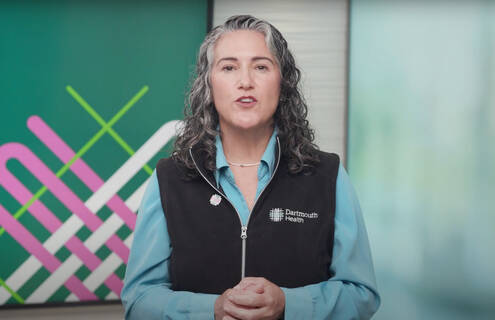
RSV (Respiratory Syncytial Virus) is a common respiratory virus that usually causes mild, cold-like symptoms. Most recover from it in a week, but the virus can be serious for some, especially babies in their first flu season and some older adults. If you suspect your baby, child or an older loved one has RSV, Dartmouth Health Children's General Pediatrics Section Chief Susanne Tanski, MD, MPH, has these answers to common questions about RSV.
Who is most at risk with RSV?
Babies in their first year, or in their first respiratory season, are more at risk when contracting the virus. That’s because not only do people get the sickest when first exposed, but a baby’s tiny airways can lead to more severe disease. Adults and children with certain medical problems—such as heart disease, cystic fibrosis, and certain lung diseases—also are more vulnerable. In addition, the elderly have weaker immune systems overall, so they can become very sick with RSV.
What does RSV look like in babies and children?
For many adults and children, RSV can look like a regular cold with a cough and nasal congestion. But for babies in their first flu season, RSV can be more acute. When the virus sits in the lower respiratory tract, rather than in the upper respiratory tract, it seems more like a chest cold than a head cold. For young babies especially, the inflammation and extra mucus can impair breathing, leading to wheezing and difficulty drinking. If you become concerned, call your pediatrician.
How can I tell the difference between RSV, the flu, a cold and COVID-19?
It can be difficult to determine whether an illness is RSV, the flu, a cold or COVID-19 but a few differences between them can help you care for your child in the most appropriate way. The flu, for example, comes on quickly, causing your child to feel very sick. RSV and a cold usually come on gradually, maybe as a tickle or a scratch in the throat, or as a little runny nose. The only assured way to know is to get a test, but doctors don't routinely test for these illnesses. Instead, we advise that you make sure your child is hydrating and that you are continuing to provide loving care. Remember, too, that most people are fine with RSV but we encourage you to monitor whether your child is becoming more ill. If so, you may need to consult your doctor.
COVID-19 is different from RSV, the flu or a cold, and it can appear in different forms. Some people start with vomiting or diarrhea. Others start with respiratory symptoms. When in doubt, ask for a test. That way you can care for your child as your doctor recommends while protecting other family members from catching COVID-19.
How do I treat RSV?
Fluids are very important for everyone, as fluids can help combat a fever, coughing and dehydration. So for babies, make sure you are giving them plenty of breast milk or formula. For everyone else, keep them hydrated. Favorite liquids, such as Gatorade or even popsicles, are fine for children past their first year. The goal is to make sure your children pee at least every 6 to 8 hours. For babies, check their diapers to make sure they are getting plenty of fluids. If your child or baby is peeing less than that, consult a doctor. Fever and pain reducers like Tylenol or Ibuprofen also can be used to help children over 6 months of age.
What can I do to help prevent RSV from spreading?
Wash your hands and make sure your children do, too. Also make sure your kids stay home and keep away from other people when they are sick. And do what you can to prevent other respiratory infections in you and your loved ones by getting the updated flu shot and COVID-19 vaccine. For those with babies under the age of 8 months, don't forget to ask the baby’s provider about Nirsevimab, the new passive immunization that protects babies from severe RSV disease.
When should I be concerned?
If your child is playing, drinking, peeing and acting their normal self, they are likely okay. The same goes for adults. But babies who are irritable, lethargic, hard to console, or breathing irregularly may need to see a doctor. Signs that your young baby is struggling to breathe and you should consult a doctor include: sucking in at their neck or chest, rapid breathing, frequent wheezing, flaring nostrils, bobbing heads, or grunting. Remember, too, that someone who is hydrated should pee at least every 6 to 8 hours. If your baby’s diapers are not wet or your child is not going to the bathroom often enough, consult a doctor.
For more information about caring for your children, go to the Health and Safety Tips page on the Dartmouth Health Children's website.